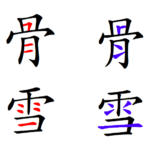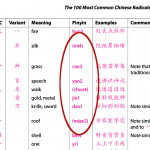Articles in the ‘Distinctively Chinese’ category
-
Chinese character variants and font differences for language learners
Small details sometimes matter when writing Chinese characters, but sometimes they don’t. Figuring out which details to pay attention to is made even harder by character variants and font differences!
Read → -
Should you learn the pronunciation of radicals?
Learning the building blocks of Chinese characters is a great idea, but what should learn about each character component? And more specifically, should you learn the pronunciation of radicals?
Read → -
Student Q&A, June 2024: How much time on flashcards, Remembering the Hanzi, and resources for learning characters
How much time should you spend on flashcards? Is Remembering the Hanzi good for learning Chinese characters? And what resources should you use if you want to understand the writing system better?
Read → -
Chinese character learning for all students
Learning to write Chinese characters by hand takes a lot of time. In today’s digital era, is it necessary to learn handwriting? Let’s explore the advantages and disadvantages for second-language learners and discuss what an effective curriculum that caters to all students might look like!
Read → -
Learning to hear the sounds and tones in Mandarin
As infants, we perceive the world without categories. Learning our first language forms sound categories, aiding understanding but losing other sound distinctions. As adults learning a second language, we need to regain this ability. But how?
Read → -
24 great resources for improving your Mandarin pronunciation
Using the right resources is important when learning anything, but it’s essential when learning Mandarin pronunciation. In this article, I share my favourite resources, most of which are completely free!
Read → -
Beyond tīng bu dǒng, part 6: Why is listening in Chinese so hard?
Many people assume that the hardest part of learning Chinese must be the characters or the tones, but it turns out that most learners struggle more with listening comprehension. Why is that, and what can you do about it?
Read → -
Chengyu, a magic key to Chinese language and culture, or a waste of time?
Chengyu are idioms linked to ancient literature. Are they the key to Chinese language and culture or a waste of time?
Read → -
Interview: Insights from Skritter’s Complete Guide to Learning Chinese
If I wrote a comprehensive guide to learning Chinese with a special focus on vocabulary, what would it look like? Now you can find out – for free!
Read → -
The best podcasts for learning Chinese in 2024
Podcasts let you create your own Chinese immersion experience, with level-appropriate stories and authentic conversations. Learn flexibly on the go with the best podcasts for beginners, intermediate and advanced students!
Read →









